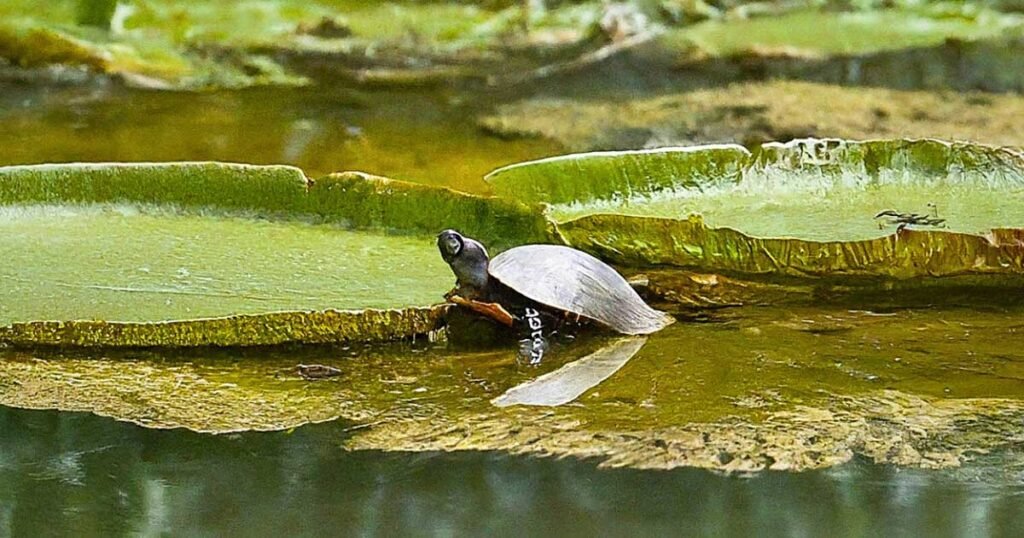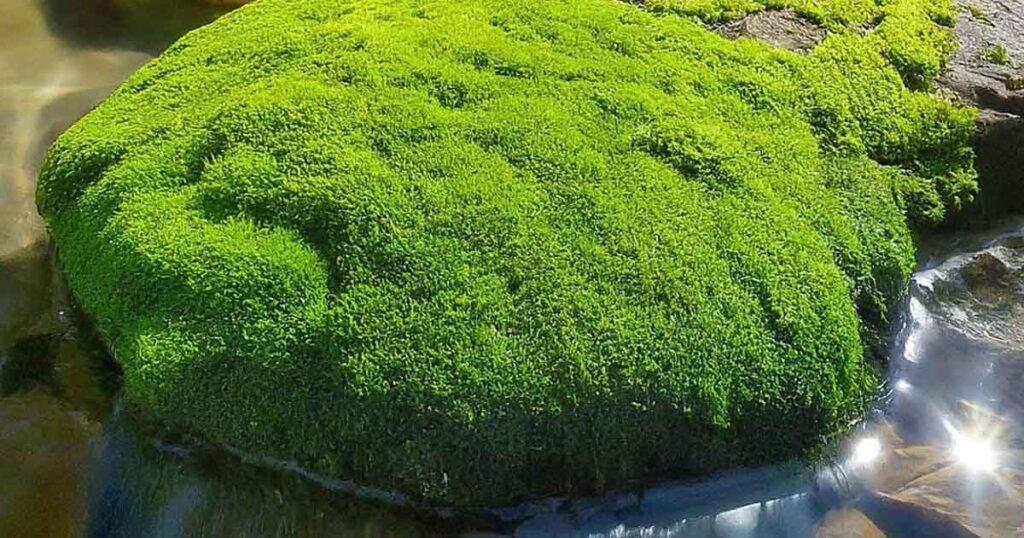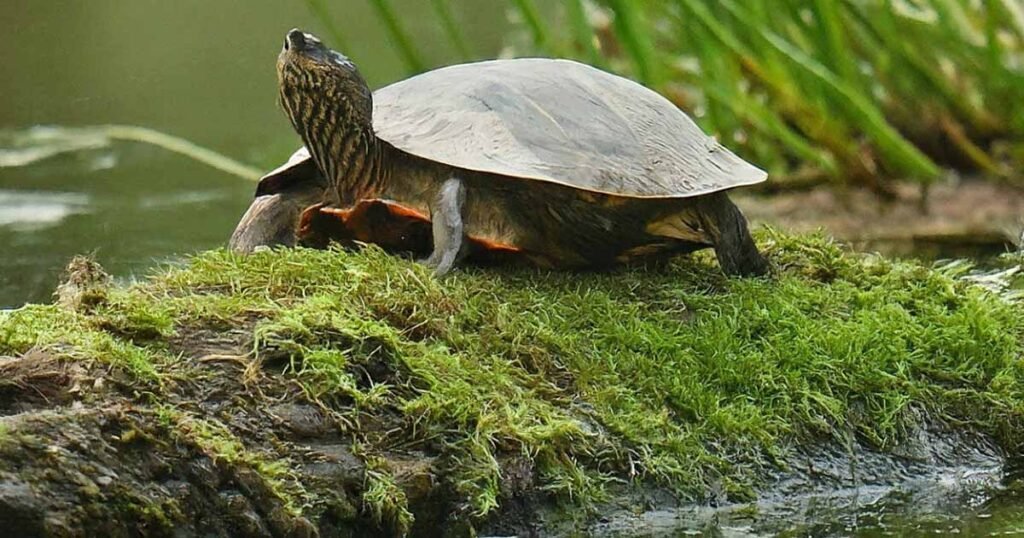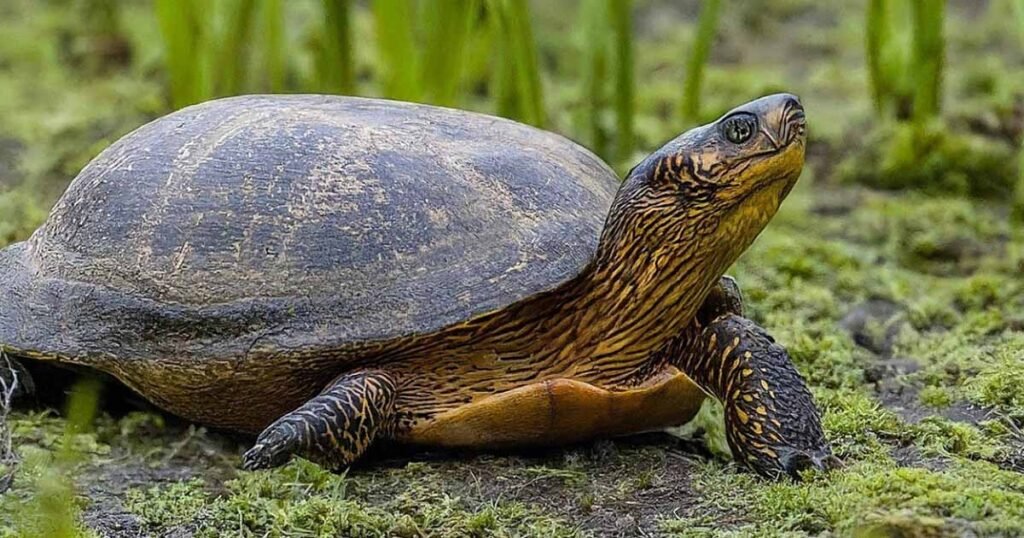Turtles are quite intriguing reptiles and they follow a diverse diet habit. If you have any basic knowledge about turtles, then you may be aware of their omnivore. It means they have a surprising appetite for both plant and meat-based food. So, as plant-eating creatures, do turtles eat algae? Especially omnivore or herbivore turtles consume algae.
Algae is a kind of organism that grows in a variety of wet environments like underwater, damp soil, rock, and even on the surface of moist tree bark.
The most common concept about algae is that people think it is a plant because it has a vibrant green color and looks like a plant. But, interestingly, algae is neither a plant nor an animal. So, let’s deep-dive into the question “Do turtles eat algae” and the specifics about turtle and algae diets.
Do Turtles Eat Algae?

Yes, turtles eat algae, especially those that live in wet or moist environments. However, not all turtle species have algae-eating habits. Many aquatic turtles eat algae as an available food in their underwater or moist environments. Turtles’ diet habits mostly depend on their surroundings’ availability.
There are several health benefits of consuming algae for turtles. In the wild, algae is turtles’ available food and captivates. Turtles can also have algae from the water tank if it is cleaned for a short time.
Algae General Nutrition Factors Breakdown

Nutritionally, algae is an excellent source of protein, vitamins, and minerals. Even though turtles eat algae in the wild, this table focuses on the nutritional content of edible algae. The exact nutrients found in wild algae can vary depending on the species, environment, and even the season.
This table provides a general picture of what these green snacks might offer turtles. Despite the differences in amounts between wild and cultivated algae, these nutrients give us an idea of why algae can be helpful to turtles:
| Nutrient | Spirulina | Chlorella | Kelp | Dulse |
| Protein (g per 100g) | 60-70 | 45-60 | Moderate | Moderate |
| B Vitamins | High | High | ✓ | ✓ |
| Vitamin B12 | High | Moderate | ✓ | ✓ |
| Iron (mg per 100g) | High | Moderate | ✓ | ✓ |
| Magnesium (mg per 100g) | High | Moderate | ✓ | ✓ |
| Zinc (mg per 100g) | Moderate | Moderate | ✓ | ✓ |
| Iodine (mg per 100g) | Low | Low | High | High |
| Omega-3 Fatty Acids | Low | Low | Moderate | Moderate |
Notes:
- Wild algae eaten by turtles may not have the same nutrient profile as edible algae for humans.
- The specific amount of each nutrient can vary depending on the algae species, location, and other factors.
- The information is just for general understanding and should be different from talking to your veterinarian about what your turtle should eat.
How Algae Diet Benefits Turtles
Aquatic or semi-aquatic turtles are known for eating algae. There are a lot of nutrients in algae that can benefit your turtle’s health! Here are a few essential nutrition:
Protein
Turtles need protein to build strong muscles and keep themselves healthy. Algae like spirulina and chlorella have a high protein content per bite. The protein helps your turtle grow, repair tissues, and maintain a strong shell, which is their ultimate defense.
B Vitamins
Turtles need B vitamins to stay energetic and keep their nervous system running smoothly. There are a lot of B vitamins in algae, like spirulina and chlorella. These vitamins help your turtle feel energized for swimming and exploring.
Vitamin B12
This specific B vitamin is crucial for healthy nerve function and red blood cell production. While some algae sources, like spirulina, are high in B12, it’s only sometimes guaranteed for all types. A balanced diet with other foods can ensure your pet turtle gets all the B12 it needs.
Minerals
These essential minerals work together to keep your turtle healthy and energetic. Your turtle’s blood needs iron, which is found in many algae varieties. Magnesium and Zinc are other minerals from algae that help muscle and nerve function, and even bone health.
Omega-3 Fatty Acids
Although omega-3 fatty acids aren’t as abundant as other nutrients, some algae varieties do have them. These fatty acids are essential for heart health and overall well-being.
Are there any Risks from Algae for Turtles?

We learned how algae can be a nutritional diet for your turtle friends, full of good stuff like protein and vitamins. The truth is algae diet is safe for turtles without any significant risks. But there are considerations you should know.
Most algae are excellent for turtles to eat. But there are a few things to watch for:
- Poisonous Algae: Not all algae types are safe for turtles. Some types of algae, like brown algae, can be harmful or poisonous to turtles. So, if you’re not sure what kind of algae is in your turtle’s home, it’s best to take it out to be safe.
- Too Much Green Soup: Imagine your turtle’s home (tank) turning into a giant green mess. If there’s too much algae growing, it can make the water dirty and smelly. It can make your turtle feel icky and even get sick.
- Shell Can Be Heavy: Sometimes, algae can grow on your turtle’s shell if the tank is not cleaned for a long time. A little bit is okay, but a whole shell covered in green might mean the water needs cleaning or your turtle needs more hiding places. Too much algae can even make your turtle’s shell sick.
Which Turtles Like Algae Treats?

There are a lot of turtle species that love algae. Let’s dive into some algae-loving turtles:
Sea Turtles
Majestic sea turtles, like the green sea turtles, are champions for the algae diet. Their specially shaped jaws let them eat seaweed and other underwater plants, so algae is a big part of their diet.
Freshwater Turtles
Many freshwater turtles, like wood turtles, enjoy a balanced diet of algae. Their meals are always because they eat insects, worms, and snails with plant-based food. Algae add vitamins and minerals to their diet.
Painted Turtles
These colorful turtles, especially Midland Painted Turtles, eat a mixed menu including algae. The more they get older, the more they turn to plants and algae types of diet for nutrition and taste.
Red-Eared Sliders
Red-eared sliders are known for their exciting eating habits. These omnivores will happily gobble up algae if it’s available, chewing with their powerful, jagged jaws.
Pond Turtles
Pond turtles, including Spotted Turtles, are all about variety. They’re omnivores, meaning they eat both plants and animals. Algae, mainly filamentous algae that grow in ponds, is a tasty part of their diet.
Snapping Turtles
These mighty turtles with strong jaws might seem like all-meat eaters, but they need a lot of plant material in their diet. Algae is a rich source of nutrients for them, and they occasionally eat algae in their diet.
Baby turtles of many species tend to eat meaty diets, more like insects and worms when they’re young. They need a lot of protein to grow strong, so they usually avoid algae until they get older.
For Pet Turtle Tank Risks of Algae
While algae is a safe and nutritious addition to your pet turtle’s diet, too much algae can be harmful to the tank. The out-of-control algae growth can pollute the water, making it cloudy and smelly for your turtle. It can even cover your turtle’s shell, leading to infections.
To avoid these issues:
- Keep your tank clean with regular water changes.
- Limit the amount of light your tank gets, as algae love sunshine.
- Consider adding some algae-eating friends like snails or fish (but choose ones that won’t become turtle snacks themselves). Your pet turtle will be happy and healthy if you keep the algae down.
FAQs
Do sea turtles eat algae?
Yes, sea turtles are primarily vegetarians. Several species heavily rely on and munch on seaweed and other underwater plants, making algae a big part of their diet.
Do turtles eat algae eaters?
Yes, some turtles do. In the wild, turtles eat what they can, like small fish from fresh water. These tiny fish are algae eaters. But it’s best to avoid adding small fish or snails to your turtle tank. They could become a tasty snack instead of algae cleaners.
Do freshwater turtles eat algae?
Many freshwater turtles enjoy algae as a healthy diet. It gives them vitamins and minerals. But remember, not all algae are safe for them. So always check what kind of algae your specific turtle can eat if you are a pet turtle owner.
Read More: What to Feed Wild Turtles
Bottom Line
We discussed a lot about turtles and algae today to give this answer: “Do turtles eat algae?” Remember, not all turtles eat algae, like how some kids love broccoli, and others wouldn’t touch it. Your turtle might be a total meat fan, or maybe they like veggies or algae snacks now and then.
The best way to find out is to ask your vet or pet store about the best food for your turtle friend. Just keep their tank clean from too much algae so they can be happy and healthy.
